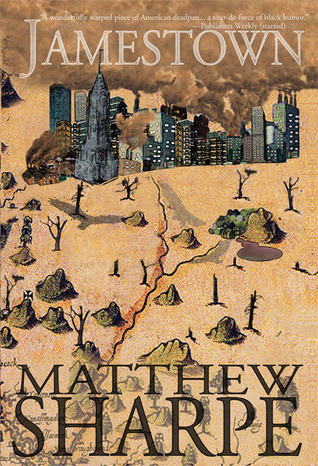Matthew Sharpe’s last novel, the surprise indie bestseller The Sleeping Father, was that rarest of literary creatures: an entirely original family novel. Now Sharpe returns with one of the smartest, funniest, bloodiest, and bawdiest novels in recent memory, a gonzo encyclopedic reimagining of the Jamestown settlement set in a post-annihilation near future that opens with the Chrysler Building plunging into the earth.
Manhattan and Brooklyn are at war, a not entirely improbable turn of events as any denizen of either borough knows. Day and night, assassins dart across the Williamsburg, Manhattan, and Brooklyn bridges, zigzagging snipers’ bullets. Food and fuel and guns are scarce. To restock his war machine, the chief executive officer of the Manhattan Company, Jimmy Stuart, dispatches an armored bus carrying a band of business executives, half of them early release convicts, south on what’s left of I-95 to set up a Virginia branch of the Manhattan Company. Onboard the “Autobus Godspeed” all types of hilarity and degeneracy occur, much of it involving knives. “Some great, quaint pre-annihilation philosopher described the movement of history as thesis, antithesis, synthesis,” says our first but by no means last narrator, Manhattan Co.’s “communications specialist,” Johnny Rolfe, “whereas I’ve seen a lot more thesis, antithesis, steak knife, bread knife.”
“Don’t be so pessimistic [Jack Smith, the bus’s mechanic, tells Rolfe].“We’ll get down to Virginia, trade with the Indians—”
“‘Trade,’ right.”
“Maybe someone like you’ll meet a nice Indian girl and fall in love.”
As anyone who paid attention in third grade will remember, the nice Indian girl Rolfe falls for is Pocahontas, only in Sharpe’s lunatic reimagining they don’t marry and have a kid, as they did in real life. Instead, they flirt, shamelessly and virtually, via PDA, IM, text messaging, and even—when Pocahontas’s father’s adviser, pot-smoking psychiatrist Sidney Feingold, confiscates her wireless—telepathically. “I prefer to exchange a few emails with a guy before I date him,” Sharpe’s Pocahontas says. “You can tell a lot about a guy by how he emails.” And Rolfe (screen name: GREASYBOY) gives good enough email to convince Pocahontas (CORNLUVR) to fall for him, though she still has her reservations: “We have to make sure it don’t stop with touch too cuz in our contemporary political climate plus our climate climate one or both of us could get badly wounded and/or disfigured making sex impossible and/or disgusting so I gotta know you don’t just want me for the sex […] don’t be a typical boy don’t be a typical boy…”
If you haven’t noticed, Matthew Sharpe isn’t afraid to play on the page. The settlers’ first face-to-face with the Indian chief Powhatan is conducted via wireless. Manhattan Co. CEO Jimmy Stuart terrorizes his girlfriend with horrid post-sex haiku. And Pocahontas, when she’s not channeling Britney Spears (“Oops, I did it again”) or Lou Reed (“I’m waiting for my man, twenty-six heartbeats in my hand”), saves Jack Smith from death-by-baseball-bat. All this, and more, Sharpe renders in lovely, high-octane prose. Of course, no book exists entirely in a vacuum, and Sharpe’s naughty, no-holds-barred, language-crazed roller coaster ride would never have been written had it not been for Blood Meridian or Beckett, but Jamestown is a big book, large in scope and ambition, and built, like the country it skewers, to contain multitudes.





